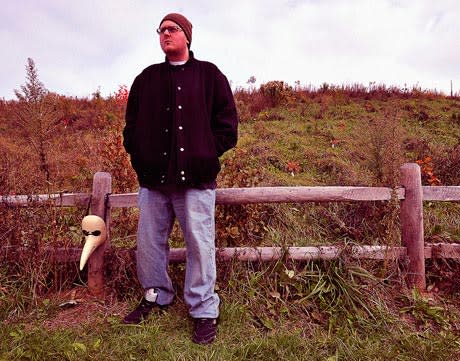On Jonestown, D-Sisive uses one of the largest mass suicides in human history as a metaphor for everything from alienation ("One Way Ticket") to the power of the artist ("In the Jungle"). Add in dense, sample-heavy beats, most of which come courtesy of producer Muneshine, and the result is an album that is alternately head-nodding, creepy and darkly humorous. The Jonestown Massacre isn't the only culture signpost D references. On the punch line-heavy "Boom Baba Boom," he manages to connect Stand By Me, Juice and David Blaine, while on "1974," he uses John Mellencamp and Frank Sinatra to talk about his relationship with his father. Overall, the tone of this album ranges from dark to very dark. "Ken Park," which takes its name from the Larry Clary film, is a downright gut wrenching examination of suicide. Even the album's slightly more upbeat songs ("West Coast," "They Got Guns") have unsettling undertones. Jonestown combines the rewind-worthy wordplay and punch lines of D-Sisive's early work with the introspection of his more recent output. It marks a high point for him, and is hopefully a sign of even bigger things to come.
Why Jonestown?
Eleven years ago, I was on tour with DJ Serious, and I went into a used bookstore. We were in Halifax; I bought a book called The Guyana Massacre, and from that time, I just found it very interesting. I don't know if that's a disrespectful word to use, but it's a fascinating subject. A year-and-a-half ago, I saw the PBS documentary titled Jonestown; it totally brought my interest back, and I started making connections between Jim Jones and any sort of musician. And I thought it really isn't that different.
You're releasing two albums in one year. How much difference will there be between this album and the one you released in the spring?
A huge difference. Let the Children Die was really specific and really personal, Jonestown, not so much. The idea to do another album came from a bad review I received. It's not like I'm one of those guys that's obsessed with reviews, but to sum up the review, it was like, "I get it, but his skills as a rapper aren't up to par." That was somewhat offensive to me, because when I started as a rapper back in '95, I was 100-percent [a] punch line rapper. Writing songs was not on the priority list. So I said, "Okay, now I'm going to put out something free, just to show that I can rap."
(Urbnet)Why Jonestown?
Eleven years ago, I was on tour with DJ Serious, and I went into a used bookstore. We were in Halifax; I bought a book called The Guyana Massacre, and from that time, I just found it very interesting. I don't know if that's a disrespectful word to use, but it's a fascinating subject. A year-and-a-half ago, I saw the PBS documentary titled Jonestown; it totally brought my interest back, and I started making connections between Jim Jones and any sort of musician. And I thought it really isn't that different.
You're releasing two albums in one year. How much difference will there be between this album and the one you released in the spring?
A huge difference. Let the Children Die was really specific and really personal, Jonestown, not so much. The idea to do another album came from a bad review I received. It's not like I'm one of those guys that's obsessed with reviews, but to sum up the review, it was like, "I get it, but his skills as a rapper aren't up to par." That was somewhat offensive to me, because when I started as a rapper back in '95, I was 100-percent [a] punch line rapper. Writing songs was not on the priority list. So I said, "Okay, now I'm going to put out something free, just to show that I can rap."
